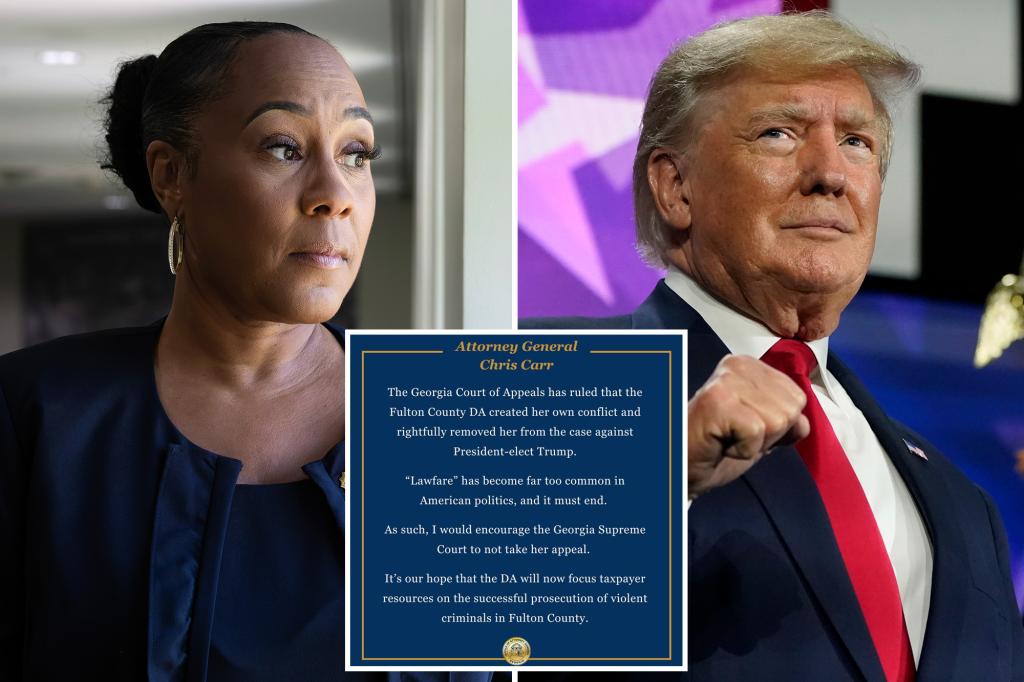The legal battle surrounding the 2020 election interference case against former President Donald Trump in Fulton County, Georgia, has intensified, with Georgia Attorney General Chris Carr urging the state Supreme Court to reject District Attorney Fani Willis’s appeal against her disqualification from the case. The Georgia Court of Appeals previously removed Willis due to a perceived “significant appearance of impropriety” stemming from her relationship with a special prosecutor she hired, Nathan Wade. Carr’s intervention adds another layer of complexity to the proceedings, raising questions about political motivations and the integrity of the prosecution.
Carr, a Republican and declared candidate for the 2026 Georgia gubernatorial election, publicly stated his opposition to Willis’s appeal, arguing that the Court of Appeals ruling was justified and that Willis should focus on prosecuting violent crime within Fulton County rather than pursuing what he termed “lawfare” against Trump. He characterized Willis’s pursuit of the case as politically motivated, suggesting it’s a tactic employed too frequently in contemporary American politics. Carr’s stance aligns him with those critical of Willis’s handling of the Trump investigation and underscores the politically charged nature of the case.
Willis responded forcefully to Carr’s statements, accusing him of attempting to improperly influence a case in which he is a subpoenaed witness. She further alleged that Carr’s actions are driven by his gubernatorial aspirations rather than a commitment to upholding the law. Willis’s counter-accusation portrays Carr’s intervention as self-serving and politically motivated, raising concerns about the potential for undue influence in the legal process. This exchange highlights the deep divisions and escalating tensions between the two officials.
The controversy surrounding Willis’s involvement centers on her relationship with Nathan Wade, whom she hired as a special prosecutor. Allegations have surfaced concerning lavish spending by Wade, totaling approximately $654,000, on gifts and trips for Willis while she was his superior. These accusations raise ethical questions about the use of taxpayer funds and the potential for conflicts of interest. Furthermore, Willis faces a separate misconduct probe in the state Senate related to allegations of misusing taxpayer money on the Trump case.
This complex legal and political drama unfolds against the backdrop of Carr’s gubernatorial ambitions and Willis’s recent re-election as District Attorney. The interplay of these factors further complicates the narrative and raises questions about the potential impact on the 2026 gubernatorial race. The ongoing legal challenges and accusations of misconduct cast a shadow over both officials and the broader political landscape in Georgia.
The clash between Carr and Willis represents a microcosm of the larger political divisions in the United States, where legal proceedings are increasingly intertwined with political maneuvering. The accusations and counter-accusations between these two high-profile figures underscore the challenges of ensuring impartiality and maintaining public trust in the justice system. The outcome of Willis’s appeal and the ongoing misconduct probe will have significant implications for the future of the Trump case and the political careers of both Carr and Willis. The controversy also raises broader questions about the appropriate use of prosecutorial discretion and the potential for conflicts of interest in high-stakes political cases.

